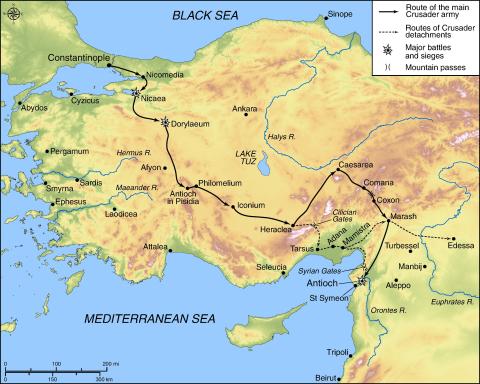The Road to Antioch
[4.10.5] Illīc dīvīsit sē ab aliīs Tancredus Marchisī fīlius, et Balduīnus comes frāter ducis Godefridī, simulque intrāvērunt vallem dē Botrenthrot. Dīvīsit quoque sē Tancredus, et vēnit Tharsum cum suīs mīlitibus. Exiērunt dēnique Turcī dē urbe, et vēnērunt obviam eīs, atque in ūnum congregātī properāvērunt ad bellum contrā Chrīstiānōs. Appropinquantibus itaque nostrīs et pugnantibus, dedērunt inimīcī nostrī fugam, revertentēs in urbem celerī gressū.
[4.10.6] Tancredus vērō mīles Chrīstī pervēnit laxātīs lōrīs, et castramētātus est ante portam urbis. Ex aliā igitur parte vēnit vir inclitus comes Balduīnus cum suō exercitū, postulāns Tancredum, quātinus eum amīcissimē in societātem cīvitātis dignārētur suscipere. Cui ait Tancredus: “Tē omnimodō in hāc societāte dēnegō.” Nocte itaque superveniente, omnēs Turcī tremefactī fugam ūnā arripuērunt. Exiērunt dēnique habitātōrēs cīvitātis sub illā noctis obscūritāte, clāmantēs excelsā vōce: “Currite, invictissimī Francī, currite, quia Turcī, expergēfactī vestrō timōre, omnēs pariter recēdunt.”
notes
vocabulary
4.10.5
obviam: in the path of, face to face (with)
4.10.6
lōrum –ī, n.: bridle; reins (OLD 3b)
societās –ātis, f.: partnership
itaque: accordingly, and so
expergēfaciō –facere –ffēci –factum: to stir up (emotionally)

